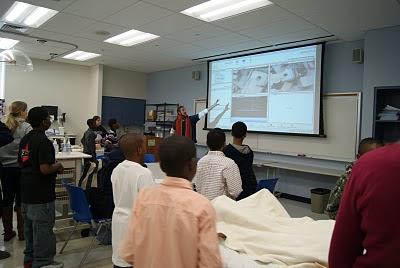 Ruth McDermott-Levy, PhD, RN, assistant professor (center) with AACDC's Associate Director Zeina El Halabi and Americorps volunteer Wiam Mutan.
Ruth McDermott-Levy, PhD, RN, assistant professor (center) with AACDC's Associate Director Zeina El Halabi and Americorps volunteer Wiam Mutan.Newly arrived immigrants who settle in the Greater Philadelphia area frequently seek assistance from the Arab-American Community Development Cooperation (AACDC). This non-profit organization which the College learned about from Marwan Kreidie, M.A., adjunct professor in the Political Science Department and executive director of AACDC, seeks to provide services addressing health care needs, citizenship learning, English as a second language and immigration issues to the estimated 30,000 Arab-Americans living in the five county area. Under the guidance of Ruth McDermott-Levy ’96 M.S.N., ’08 Ph.D., R.N., assistant professor, senior nursing students have the opportunity to participate in a community health clinical rotation at this social service agency. This experience provides students an opportunity to address health promotion strategies with the consideration of the culture and Muslim religious practices. While on the campus of the AACDC, the students who participate in this clinical rotation experience a kind of cultural immersion without traveling abroad.
“Immigrant populations are vulnerable to many of the social determinates that influence health such as poor quality housing, income, education, being powerless, and discrimination. The way population health data is collected, the Arab immigrant community does not usually show up on the ‘health needs radar screen,’ but they are subject to many of the same problems of other minority groups,” explains Dr. McDermott-Levy. She further notes, “I am able to use my experience with Arab-Muslim students from Oman to understand cultural, religious, and health practices to help students address the needs of this important group. My opportunities led to my doctoral dissertation concerning Muslim women college students studying in the United States.”
For the past three years, the AACDC provides a rich setting for student interactions with the community. After completion of a comprehensive community assessment of the Center which offers an Islamic day school for children, a food bank for families, job skill training, health education programs, support services to refugees and scholarly programs from visiting professors (which are open to the public), the Villanova Nursing students develop a health promotion program to meet the needs of the community. Our students have worked with an English-as-Second-Language (ESL) tutor to teach breast health, healthy food choices, managing stress related to acculturation and an integrative pest management program. Nursing students provide information regarding health insurance options for adults and children as well as health lessons and health screenings for children in the adjoining Islamic day school. As a positive consequence of the Villanova presence, one member of the community now offers weekly exercise classes for Arab women which are modeled after a presentation by the Villanova students. The students may also observe an Islamic worship service and sample Arab food during their clinical rotations which enriches their understanding of the culture and daily life of the community.
The relationship with this clinical site has enhanced the development of needed services for this immigrant community while providing the opportunity for nursing students to learn community assessment skills, health education, and cultural and religious competence through cultural immersion. Students have also had the opportunity to work with native speaking interpreters which provides experience that can be transferred when caring for those from other cultures who are not English speakers.
This fall, Dr. McDermott-Levy shared her experiences of working with our students through a presentation “Teaching the Needs of Immigrant Populations and Cultural Competence through Community Partnerships" at the American Public Health Association Annual Meeting and Exhibition in Denver. In the future, Dr. McDermott-Levy hopes to expand health promotion opportunities on topics of occupational health in the work settings where many of the members of the community are employed.
The nursing students’ experience with this new immigrant population is one example of how the College of Nursing extends its reach to diverse cultural groups and populations in the Greater Philadelphia area.







